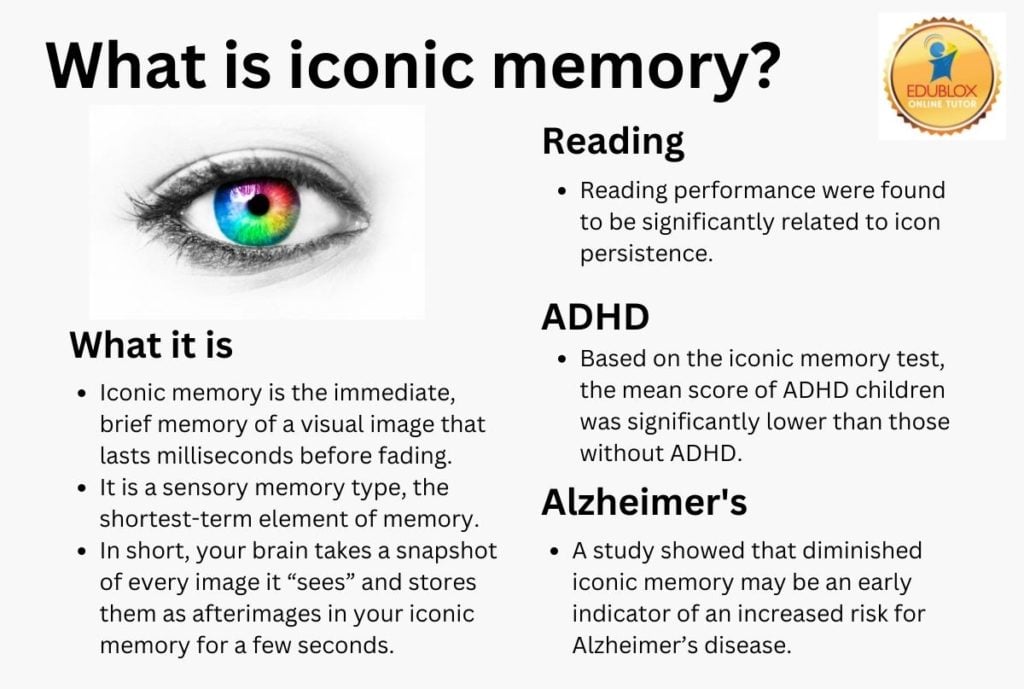
Iconic memory is the immediate, brief memory of a visual image that lasts milliseconds before fading. It is a sensory memory type, the shortest-term element of memory.
Sensory memory acts as a buffer for stimuli received through the five senses of sight, hearing, smell, taste, and touch, which are retained accurately but very briefly. For instance, the ability to look at or hear something and remember what it looked or sounded like with just a second of observation is an example of sensory memory.
The sensory memory for visual stimuli is known as iconic memory, the memory for aural stimuli as echoic memory, taste as gustatory memory, smell as olfactory memory, and touch as haptic memory. Echoic memory lasts 2 to 4 seconds, while iconic memory lasts just milliseconds before fading.
Iconic memory is part of the visual memory system, which also includes visual short-term memory and visual long-term memory.
Examples of iconic memory
- At night, you get up to have a drink of water and turn on the kitchen light. Almost instantly, the bulb burns out and leaves you in darkness, but you can briefly envision what the room looked like from the glimpse you were able to get (Cherry, 2022)
- Two girls are playing hide and seek. One of them, hiding in a closet, hears the other walking by. She jumps out and screams before diving back into the closet. The image of the girl jumping out is now an iconic memory in the mind of the second girl (YourDirectory, 2022).
- You’re on the highway when you pass a huge billboard. Your memory of what you saw on the billboard is an example of iconic memory (Perera, 2023).
In other words, your brain takes a snapshot of every image it “sees” and stores them as afterimages in your iconic memory for a few seconds.
A brief history of iconic memory
Aristotle was among the first to document the persistence of a visual presentation of an object after its disappearance, and said that dreaming involved afterimages (Allen, 1926).
In the 18th and 19th centuries, observing the trail of light engendered by a moving stick’s shining ember elicited the curiosity of many researchers. Accordingly, they delved into the empirical analyses of this phenomenon which was subsequently described as visible persistence (Coltheart, 1980).
Eventually, in 1960, the American cognitive psychologist George Sperling, via several experiments, confirmed capacity and duration as parts of a memory system called visual sensory memory (Sperling, 1960). Seven years later, Ulric Neisser introduced the term ‘iconic memory’ to refer to this fast-decaying store of memory (Neisser, 1967).
Iconic memory and reading
Riding and Pugh (1977) gave 36 nine‐year‐old children a test of image persistence in iconic memory and the Neale Analysis of Reading Ability. The reading test gave scores for fluency, accuracy, and comprehension.
All three measures of reading performance were found to be significantly related to icon persistence. Short and long image persistence resulted in a reading age on the accuracy score that was, on average, 1.75 years below that for moderate persistence.
Iconic memory and ADHD
Although visual memory has previously been studied in children with ADHD, iconic memory in these children has been less evaluated. Ahmadi et al. (2013) studied the possibility of iconic memory impairment in children with ADHD and compared the results with those without ADHD.
The experimental group was thirty 6 to 9-year-old children referred to the Imam Hosein Clinic and diagnosed with ADHD. The comparison group was thirty 6 to 9-year-old children without ADHD. Subjects’ iconic memory was assessed using an iconic memory task. Repeated measure ANOVA was used for data analysis.
Based on the iconic memory test, the mean score of ADHD children was significantly lower than those without ADHD.
Iconic memory and Alzheimer’s
A study on Alzheimer’s showed that diminished iconic memory may be an early indicator of an increased risk for Alzheimer’s disease.
In their study, Lu and colleagues (2005) tested the iconic memory in 16 people aged 65 to 99. All had mild cognitive impairment. During the test, the people were briefly shown a computer screen with letters placed in various places. Then, after looking at the screen for a moment, they were asked the position of each letter.
The researchers found that the iconic memory in those with mild impairment faded faster compared to younger or older people without cognitive impairment. Many of these subjects will get Alzheimer’s in the next ten years.
Improving iconic memory
Iconic memory is increasingly recognized as a crucial cognitive skill. By improving this critical skill, one can realize gains in key areas, from school to work to retirement.
The good news is that iconic memory can be improved with practice, and Edublox’s Development Tutor aims at doing just that. Edublox also offers live online tutoring to students with dyslexia and other learning disabilities. Our students are in the United States, Canada, Australia, and elsewhere. Book a free consultation to discuss your child’s learning needs.
Key takeaways


